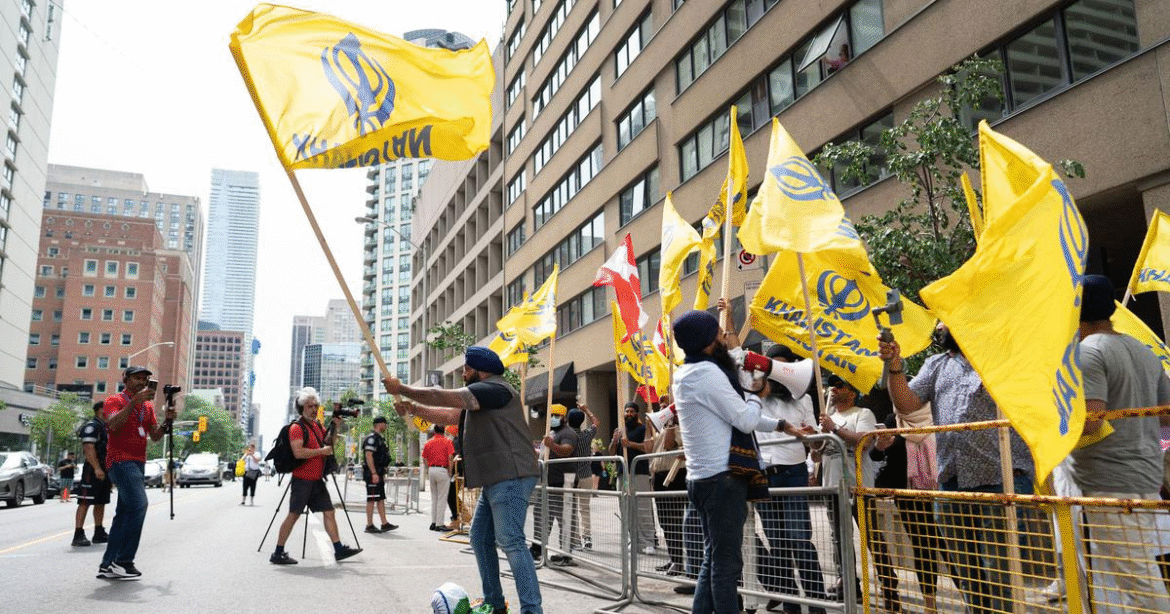AI Generated Summary
- It is a direct attack on the sovereignty of India and on Canada’s own institutions, given that such an act would violate international diplomatic norms under the Vienna Convention.
- In Vancouver, the US-based group Sikhs for Justice (SFJ) has openly threatened to “siege” the Indian Consulate, even releasing a poster with the new High Commissioner Dinesh Patnaik’s face marked as a target.
- At a time when India and Canada are trying to repair relations, turning a blind eye to Khalistani extremism will only deepen mistrust.
As India and Canada cautiously move toward restoring diplomatic normalcy, the dark shadow of Khalistani extremism once again threatens to derail progress. In Vancouver, the US-based group Sikhs for Justice (SFJ) has openly threatened to “siege” the Indian Consulate, even releasing a poster with the new High Commissioner Dinesh Patnaik’s face marked as a target. This is not peaceful advocacy. This is intimidation—bordering on terrorism.
A Clear and Present Threat
SFJ’s call for a “siege” is more than rhetoric. It is a direct attack on the sovereignty of India and on Canada’s own institutions, given that such an act would violate international diplomatic norms under the Vienna Convention. By urging Indo-Canadians to avoid visiting their consulate, SFJ is not only attempting to shut down legitimate services but also positioning itself as an authority above Canada’s rule of law.
The claim that Indian consulates run “spy networks” is the same recycled propaganda that has fueled extremist narratives for years. Linking their threats to Prime Minister Trudeau’s 2023 statement about Hardeep Singh Nijjar’s killing is a calculated attempt to keep grievance politics alive—two years later, without conclusive proof presented in court.
The Dangerous Echo Chamber of Extremism
Canada’s own government has quietly acknowledged what New Delhi has long argued: extremist Khalistani outfits such as Babbar Khalsa International and the International SYF, both listed as terrorist organisations under Canadian law, are still active. According to an internal report cited by NDTV, these groups now operate less as large outfits and more as smaller cells or individuals loosely aligned with the Khalistan cause.
This evolution makes them harder to track—but no less dangerous. Financing flows from within Canada itself, proving that this is not merely an imported problem but one that has been nurtured in Canadian soil.
Canada’s Credibility is on Trial
If Ottawa is serious about protecting its democratic institutions, it cannot allow its soil to be used for violent intimidation against another nation. Witness protection for leaders of the Khalistan Referendum campaign may be necessary on grounds of safety, but it must not be twisted into legitimizing their extremist politics.
At a time when India and Canada are trying to repair relations, turning a blind eye to Khalistani extremism will only deepen mistrust. Worse, it will embolden radicals who thrive on precisely such hesitation.
A Moment of Decision
Canada prides itself on being a defender of multiculturalism and free speech. But freedom of speech ends where threats of violence begin. Target posters of Indian diplomats are not free expression—they are incitement. Calls to “siege” consulates are not democratic protest—they are assaults on diplomacy.
Ottawa must act decisively. Allowing Khalistani extremists to set the agenda not only undermines Indo-Canadian ties but also erodes Canada’s standing as a responsible democracy. Silence is no longer an option.




